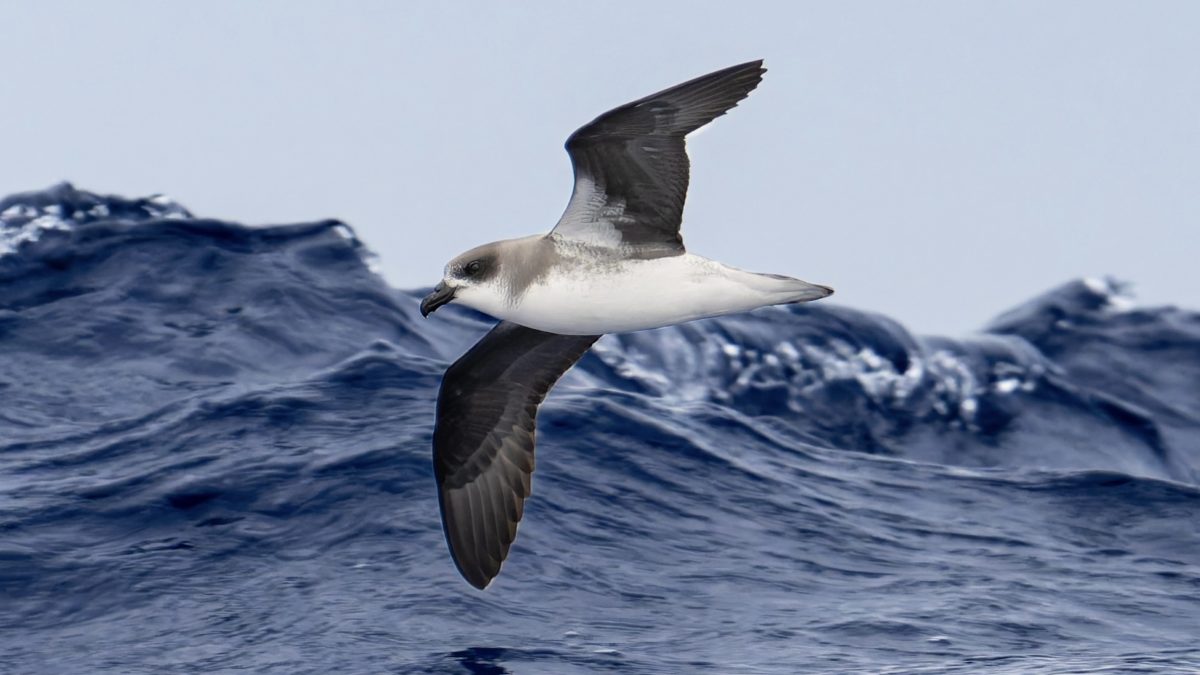Groundbreaking Study Reveals Oceanic Seabirds Chase Tropical Cyclones
https://www.whoi.edu/press-room/news-release/groundbreaking-study-reveals-oceanic-seabirds-chase-tropical-cyclones/
Groundbreaking Study Reveals Oceanic Seabirds Chase Tropical Cyclones
July 9, 2024
 A new study from the WHOI and partners reveals the pelagic seabird Desertas Petrel exhibits unique foraging behaviors during hurricane season. Contrary to other pelagic seabirds, these petrels do not avoid intense tropical cyclones but instead exploit the dynamic conditions for their benefit. (Photo by: ©Kirk Zufelt)
A new study from the WHOI and partners reveals the pelagic seabird Desertas Petrel exhibits unique foraging behaviors during hurricane season. Contrary to other pelagic seabirds, these petrels do not avoid intense tropical cyclones but instead exploit the dynamic conditions for their benefit. (Photo by: ©Kirk Zufelt)
Woods Hole, Mass. -- A new study published today in Current Biology, "Oceanic Seabirds Chase Tropical Cyclones," reveals that the rare Desertas Petrels (Pterodroma deserta), a wide-ranging seabird in the North Atlantic, exhibit unique foraging behaviors during hurricane season. Contrary to other pelagic seabirds, these petrels do not avoid intense tropical cyclones but instead exploit the dynamic conditions for their benefit, providing new insights into the impact of cyclones on open ocean marine life.
"Initial studies suggested that seabirds either circumnavigate cyclones or seek refuge in the calm eye of the storm. However, the Desertas Petrels we tracked did neither; instead, one-third of them followed the cyclone for days, covering thousands of kilometers,” stated Francesco Ventura, lead author and a Postdoc Investigator in Biology at the Woods Hole Oceanographic Institution (WHOI). “When we saw the data, we nearly fell off our chairs. This is the first time we have observed this behavior.”
“It’s striking how well the birds know how to exploit the large-scale wind conditions over the North Atlantic for their travels,” said Caroline Ummenhofer, Associate Scientist, Physical Oceanography, at WHOI. “When you overlay the petrels’ foraging trips on top of average winds, it’s a very close match.”
The Desertas Petrels nest on the Bugio Island in Portugal, located off the western coast of North Africa. This island hosts the only known nesting colony of these pigeon-sized seabirds in the world, with fewer than 200 pairs residing on a plateau surrounded by steep cliffs. During their six-month breeding season, Desertas Petrels embark on extraordinary foraging journeys, often spending weeks at sea and flying roundtrips up to 7,500 miles across the Atlantic in search of food. They belong to the genus Pterodroma, which means "wings on the run."
[...]
=========
https://www.sciencedirect.com/science/article/abs/pii/S0960982224008066
Oceanic seabirds chase tropical cyclones
Author links open overlay panelFrancesco Ventura 1 9 10, Neele Sander 2 3, Paulo Catry 4, Ewan Wakefield 5, Federico De Pascalis 6, Philip L. Richardson 2, José Pedro Granadeiro 7, Mónica C. Silva 8, Caroline C. Ummenhofer 2
https://doi.org/10.1016/j.cub.2024.06.022
Highlights
• Oceanic seabirds move toward tropical cyclones during foraging trips
• Tracked birds followed the wakes of cyclones for days and thousands of kilometers
• Along the wakes, surface chlorophyll sharply increased due to enhanced mixing
• Cyclones generate foraging opportunities for oceanic seabirds
[...]
